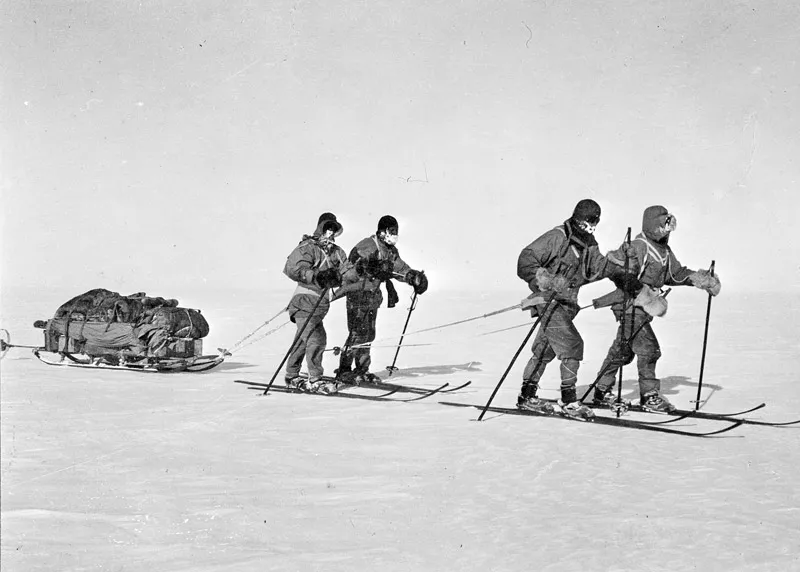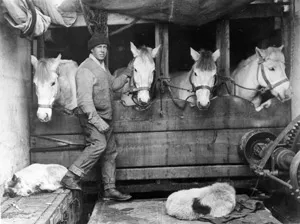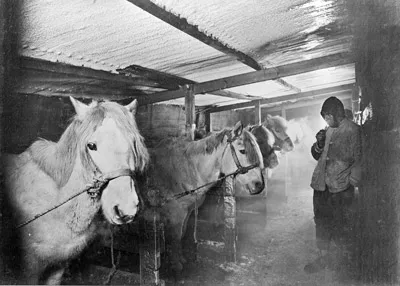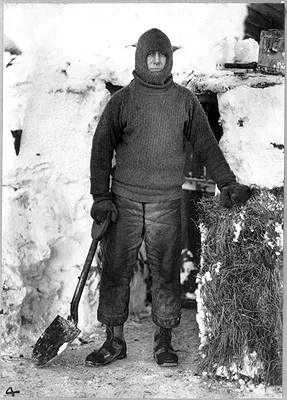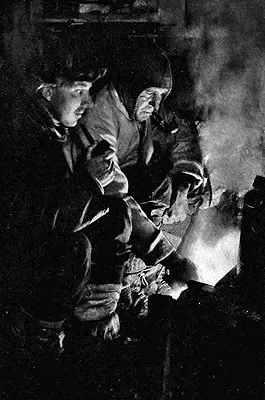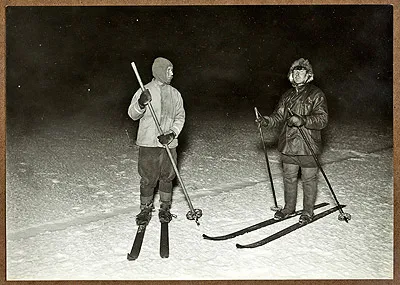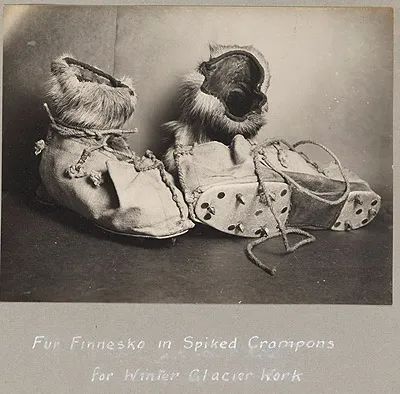Oates, Lawrence Edward Grace - Captain
1880-1912 - Biographical
notes
In charge of ponies - Terra Nova 1910-13
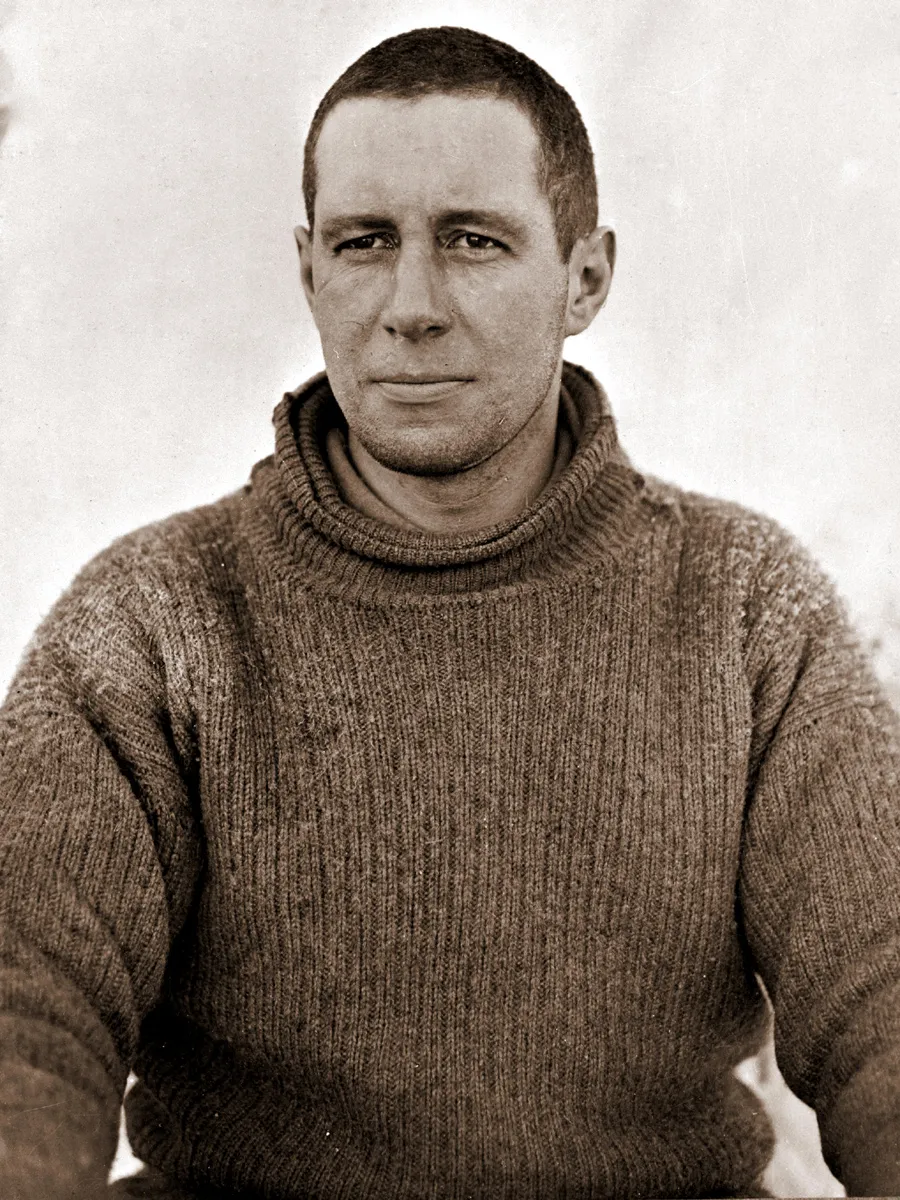
Captain Lawrence E.G. Oates
- Titus, The Soldier
17th March 1880 - 16th March
1912
Born London in 1880 into a wealthy family, Oates attended Eton College for two years before attending an army "crammer" school and joining the army in 1898. He served in the Boer War with distinction, a gunshot wound to his left leg left it an inch shorter than the right and causing him to walk with a limp. Sometimes known as "Titus" or "The Soldier".
He applied to Scott to join the Terra Nova Expedition and was accepted because of his expertise with horses, his role was to look after the 19 ponies intended for sledge hauling. Oates contributed £1,000 (worth about £116,000 in 2018) to the expedition.
He was rather disparaging about the quality of the ponies that Scott had bought, of Scott's lack of expertise in his endeavour and at times of Scott himself.
Oates was involved with depot laying in January-March 1911 as preparation for the south pole attempt later in the year. Starting in November 1911 he accompanied Scott's Polar Party initially by leading a very difficult to handle pony named Christopher pulling a sledge of supplies. At the top of the Beardmore Glacier Scott selected Oates to be one of the 5 man South Pole Party. Upon reaching the pole on the 17th of January 1912, they found Amundsen's Norwegian flag and tent already there.
All five men of the polar part died on the return journey from the pole.
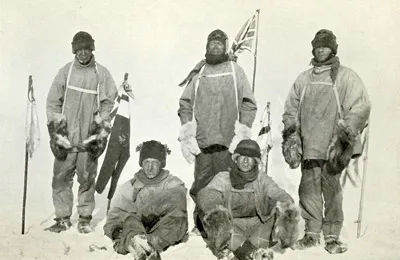
The South Pole party
l-r: Oates, Bowers, Scott, Wilson, Evans.
18th of Jamuary
1912 at the South Pole.
Oates was the second of the pole party to die on the 16th of March 1912.
How did Captain Oates die?
Along with Evans, Oates weakened faster than the other men in the polar party being particularly affected by frostbite in his feet and then his hands.
Oates walked with a pronounced limp as a result of a war wound that left him with his left leg being an inch shorter than the right leg. It was his injured leg that began to give trouble, probably the old injury making him more susceptible to cold temperatures.
All dated quotations on this page are from Scott's diary.
Oates seems to be feeling the cold
and fatigue more than the rest of us...
Jan 14th
1912
I don't like the easy way in
which Oates and Evans get frostbitten.
Jan 24th 1912
At this point on the return journey, Bowers, Scott and Wilson were managing relatively well though all of the men were suffering the slow relentless effects of insufficient food for their daily exertions.
There is some speculation and claims that the war wound to Oates leg may have been giving him trouble due to the effects of scurvy, even as far as re-opening as old wounds are reputed to do in the later stages. This is at best unproven. While the early effects of scurvy may have be manifest in all of the men due to the lack of vitamin C in their diet, it takes a long time to develop fully and they probably weren't without vitamin C for long enough for it to have been other than a somewhat contributory factor to their problems.
The troubles with frostbitten feet stems in part from the insulating boots they had which were finnesko reindeer skin boots lined with a particularly fine form of dried sedge called sennegrass. These are soft boots from Lapland, they are very effective in cold climates but not suitable for harder work such as marching everyday. They would wear out quite quickly, the sennegrass would flatten down and they would need to be replaced, eventually there were no more replacements to be had.
Frightfully cold starting; luckily
Bowers and Oates in their last new finnesko.
February
29th 1912
Oates continued to suffer from frostbitten feet for some time before things became too difficult to put without it becoming apparent to the other men.
Titus Oates disclosed his feet,
the toes showing very bad indeed, evidently bitten by the
late temperatures.
March 2nd 1912
The result is telling on all, but
mainly on Oates, whose feet are in a wretched condition.
One swelled up tremendously last night and he is very lame
this morning.
March 5th 1912
Oates began to slow the group down now as Evans had earlier.
Soldier has become a terrible hindrance,
though he does his utmost and suffers much I fear.
March 5th 1912
Poor Oates is unable to pull, sits
on the sledge when we are track-searching - he is wonderfully
plucky, as his feet must be giving him great pain. He makes
no complaint, but his spirits only come up in spurts now,
and he grows more silent in the tent.
March 6th 1912
Scott continues to mention Oates in his diary almost on a daily basis repeating similar themes. The following entry indicates a problem with the finnesko in that they hold moisture through the day that freezes hard overnight when they are taken off. The next day they can only be put only slowly as the ice is thawed slowly by body heat as they are softened and put on a little at a time. Oates has the hardest job of all, probably due to frostbite and by now gangrene meaning poor or in part, no circulation to his feet.
Worse and worse in morning; poor
Oates' left foot can never last out, and time over foot
gear something awful. Have to wait in night foot gear for
nearly an hour before I start changing, and then am generally
first to be ready.
March 8th 1912
The reality of the situation and what will happen becomes apparent to all the party.
Oates' foot worse. He has rare
pluck and must know that he can never get through. He asked
Wilson if he had a chance this morning, and of course Bill
had to say he didn't know. In point of fact he has none.
Apart from him, if he went under now, I doubt whether we
could get through. With great care we might have a dog's
chance, but no more.
March 10th 1912
Titus Oates is very near the end,
one feels. What we or he will do, God only knows. We discussed
the matter after breakfast; he is a brave fine fellow and
understands the situation, but he practically asked for
advice. Nothing could be said but to urge him to march as
long as he could.
March 11th 1912
Oates not pulling much, and now
with hands as well as feet pretty well useless.
March
12th 1912
Tragedy all along the line. At lunch,
the day before yesterday, poor Titus Oates said he couldn't
go on; he proposed we should leave him in his sleeping-bag.
That we could not do, and induced him to come on, on the
afternoon march. In spite of its awful nature for him he
struggled on and we made a few miles. At night he was worse
and we knew the end had come.
Should this be found
I want these facts recorded. Oates' last thoughts were
of his Mother, but immediately before he took pride in thinking
that his regiment would be pleased with the bold way in
which he met his death. We can testify to his bravery. He
has borne intense suffering for weeks without complaint,
and to the very last was able and willing to discuss outside
subjects. He did not - would not - give up hope to the very
end. He was a brave soul. This was the end.
He slept through the night before last, hoping not to wake; but he woke in the morning - yesterday. It was blowing a blizzard. He said:
"I am just going outside and may be some time."
He went out into the blizzard and
we have not seen him since.
I take this opportunity
of saying that we have stuck to our sick companions to the
last. In case of Edgar Evans, when absolutely out of food
and he lay insensible, the safety of the remainder seemed
to demand his abandonment, but Providence mercifully removed
him at this critical moment. He died a natural death, and
we did not leave him till two hours after his death. We
knew that poor Oates was walking to his death, but though
we tried to dissuade him, we knew it was the act of a brave
man and an English gentleman. We all hope to meet the end
with a similar spirit, and assuredly the end is not far.
March 16th or 17th (Scott says that he was losing track
of the days, he thought the 17th most likely)

A Very Gallant Gentleman - painting of Oates by John Charles Dollman, 1913
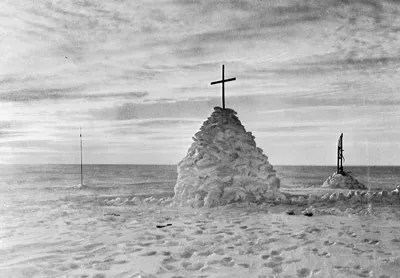
A large snow cairn built over the final
camp and the
bodies of Scott, Bowers and Wilson on the
Great Ice
Barrier (now called the Ross Ice Shelf), 12th
November
1912.
Oates walked out into a blizzard with the temperature at -40C (-40F) never to be seen again, neither was his body found when the tent with Bowers, Scott and Wilson was found later that year in November 1912.
Because of the difficulty in pulling on frozen finnesko, Oates walked out in his socks.
A cairn was erected with a cross inscribed:
"Hereabouts died a very gallant gentleman, Captain L. E. G. Oates, of the Inniskilling Dragoons. In March 1912, returning from the Pole, he walked willingly to his death in a blizzard, to try and save his comrades, beset by hardships."
He died of hypothermia, after a long period of slow starvation and the effects of frostbite, gangrene (his foot) and probably scurvy.
On what date did Oates die?
In some accounts, the date of Oates death is given as the 17th of March which will have been the day of his 32nd birthday. In his diary however Scott writes of Oates sacrifice in an entry dated:
"Friday, March 16 or Saturday 17. Lost track of dates, but think the last correct."
In the entry he writes of the events of the previous day, which places Oates death as probably the 16th of March or possibly the 15th, but not the 17th, hence I have given the date as the 16th.
References to Lawrence Oates by Cherry-Garrard in "The Worst Journey in the World"
-
We had a horse-box for the ponies, which came next, but it wanted all Oates' skill and persuasion to get them into it. All seventeen of them were soon on the floe, rolling and kicking with joy, and thence they were led across to the beach where they were carefully picketed to a rope run over a snow slope where they could not eat sand.
-
Oates was busy weighing out the pony food for the journey, sorting harness, and generally managing a most unruly mob of ponies.
-
We then followed with the ponies. "If a pony falls into one of these holes I shall sit down and cry," said Oates. Within three minutes my pony was wallowing, with only his head and forelegs visible, in a mess of brash and snow, which had concealed a crack in the sea-ice which was obviously not going to remain much longer in its present position. We got lashings round him and hauled him out.
-
It must be confessed at once that some of these ponies were very poor material, and it must be conceded that Oates who was in charge of them started with a very great handicap. From first to last it was Oates' consummate management, seconded by the care and kindness of the ponies' leaders, which obtained results which often exceeded the most sanguine hopes.
-
Titus Oates was the most cheerful and lovable old pessimist that you could imagine. Often, after tethering and feeding our ponies at a night camp on the Barrier, we would watch the dog-teams coming up into camp. "I'll give these dogs ten days more," he would murmur in a voice such as some people used when they heard of a British victory. I am acquainted with so few dragoons that I do not know their general characteristics. Few of them, I imagine, would have gone about with the slouch which characterized his method of locomotion, nor would many of them have dined in a hat so shabby that it was picked off the peg and passed round as a curiosity.
-
He came to look after the horses, and as an officer in the Inniskillings he, no doubt, had excellent training. But his skill went far deeper than that. There was little he didn't know about horses, and the pity is that he did not choose our ponies for us in Siberia: we should have had a very different lot. In addition to his general charge of them all, Oates took as his own pony the aforesaid devil Christopher for the Southern Journey and for previous training. We shall hear much more of Christopher, who appeared to have come down to the Antarctic to initiate the well-behaved inhabitants into all the vices of civilization, but from beginning to end Oates' management of this animal might have proved a model to any governor of a lunatic asylum. His tact, patience and courage, for Christopher was a very dangerous beast, remain some of the most vivid recollections of a very gallant gentleman.
-
Oates' death was a very fine one. We go on to-morrow to try and find his body. He was glad that his regiment would be proud of him. (Oates body was never found)
-
We built a cairn to mark the spot near which Oates walked out to his death, and we placed a cross on it. Lashed to the cross is a record, as follows:
-
Hereabouts died a very gallant gentleman, Captain L.
E. G. Oates of the Inniskilling Dragoons.
In March 1912, returning from the Pole, he walked willingly
to his death in a blizzard to try and save his comrades,
beset by hardship. This note is left by the Relief Expedition.
1912.
References to Lawrence Oates by Scott in "Scott's Last Expedition"
-
I originally ordered 30 tons of compressed oaten hay from Melbourne. Oates has gradually persuaded us that this is insufficient, and our pony food weight has gone up to 45 tons, besides 3 or 4 tons for immediate use.
-
Oates' whole heart is in the ponies. He is really devoted to their care, and I believe will produce them in the best possible form for the sledging season. Opening out the stores, installing a blubber stove, &c., has kept him busy, whilst his satellite, Anton, is ever at work in the stables - an excellent little man.
-
Oates had his invaluable period with the ponies; now he is a foot slogger and goes hard the whole time, does his share of camp work, and stands the hardship as well as any of us. I would not like to be without him either.
Landmarks named after Lawrence Oates
Feature Name: Oates Piedmont Glacier
Type: Glacier
Latitude: 76°25'00S
Longitude: 162°35'00E
Description: An extensive lowland ice sheet E of the Kirkwood Range, occupying the whole of the coastal platform between the Fry and Mawson Glaciers in Victoria Land. Surveyed in 1957 and named by the New Zealand Northern Survey Party of the Commonwealth Trans-Antarctic Expedition (CTAE) (1956-58).
Feature Name: Oates Coast
Type: Beach
Latitude: 69°30'00S
Longitude: 159°00'00E
Description: That portion of the coast of Antarctica between Cape Hudson and Cape Williams. The eastern portion of this coast was discovered in February 1911 by Lieutenant Harry Pennell, Royal Navy (RN), commander of the expedition ship Terra Nova during the British Antarctic Expedition (BrAE), 1910-13.
Oates Canyon - An undersea canyon on the continental rise east of Iselin Bank named in association with Oates Coast.
Oates Bank - A bank name proposed by Dr. Steven C. Cande, Scripps Institution of Oceanography. Named in association with Oates Coast.
Other Crew of the Terra Nova Expedition
Abbot,
George Percy - Petty Officer, R.N. - 1, 2, N
Atkinson, Edward
L. - R.N. - surgeon, parasitologist - 1, 2, D, P, S
Balson,
Albert - Leading seaman, R.N.- 1, 2
Bowers,
Henry Robertson - Lieutenant - 1, 2, D, C,
Po
Browning,
Frank Vernon - Petty Officer - 1, 2, N
Campbell,
Victor - Lieutenant, R.N. - 1, 2, N
Cheetham,
Alfred B. - Boatswain (Bosun), R.N.R.
Cherry-Garrard,
Apsley - Assistant zoologist - 1, 2, D, C, S
Crean,
Tom - petty officer, R.N. - 1, 2, D, P, S
Debenham, Frank
- Geologist - 1, 2, iW, iiW
Dickason,
Harry - Able Seaman - 1, 2, N
Evans, Edgar - petty
officer, R.N. - 1, iW, Po
Evans, Edward R.G.R. - Lieutenant, R.N. "Teddy Evans" -
second in command, and Captain of the Terra Nova - 1, D, P
Girev
(Geroff), Dmitriy - Dog driver - 1, 2, D, P, S
Gran,
Tryggve - ski expert - 1, 2, D, iiW, S
Lashly, William
- chief stoker, R.N. - 1, 2, P, S
Levick,
G. Murray - Surgeon, R.N. - 1, 2, N
Lillie, Dennis Gascoigne - Biologist
on the ship
McLeod, Thomas
F. - Able seaman - 1, 2
Meares, Cecil
H. - in charge of dogs - 1, D, P
Oates, Lawrence
- Capt. 6th Iniskilling Dragoons - 1, D,
Po
Ponting,
Herbert G. - Camera artist - 1
Priestley,
Raymond E. - Geologist - 1, 2, N
Omelchenko,
Anton - Groom - 1
Scott, Robert
Falcon - Commander, R.N. -
Expedition leader - 1, D, Po
Simpson,
George - Meteorologist - 1
Taylor,
T. Griffith - Geologist - 1, iW, iiW
Wilson,
Edward Adrian - chief of scientific staff and biologist - 1, D, C,
Po
Wright,
Charles Seymour - Physicist - 1, 2, iW, P, S
Key:
1 - first winter
2 - second winter
iW - first western party
iiW - second western party
N - northern
party
D - depot laying for south pole journey
P - south pole party
C - winter journey to Cape Crozier
S - search party for south Pole
party
Po - reached
South Pole
Biographical information
- I am concentrating on the Polar experiences of the men involved.
Any further information or pictures visitors may have will be gratefully received.
Please email
- Paul Ward, webmaster.
What are the chances that my ancestor was an unsung part of the Heroic Age
of Antarctic Exploration?

